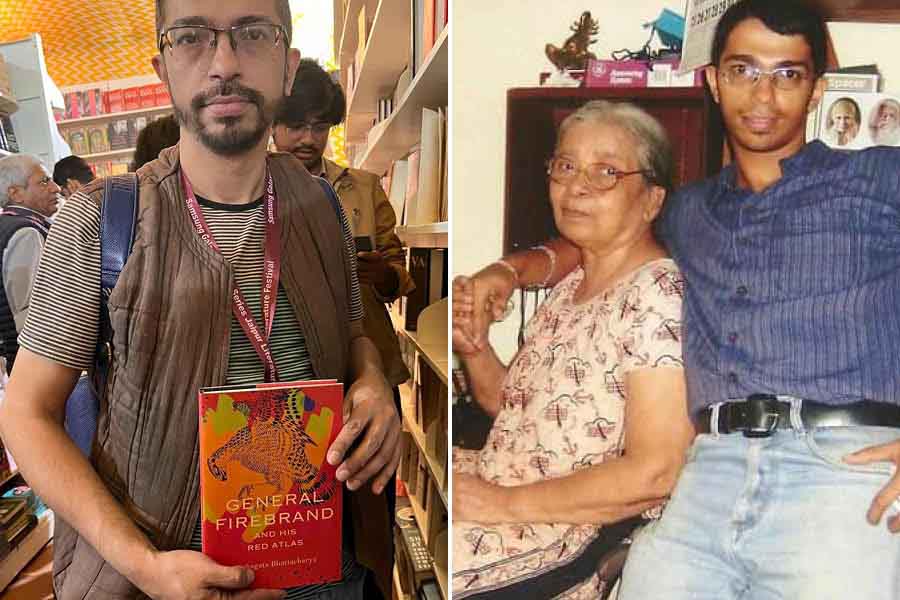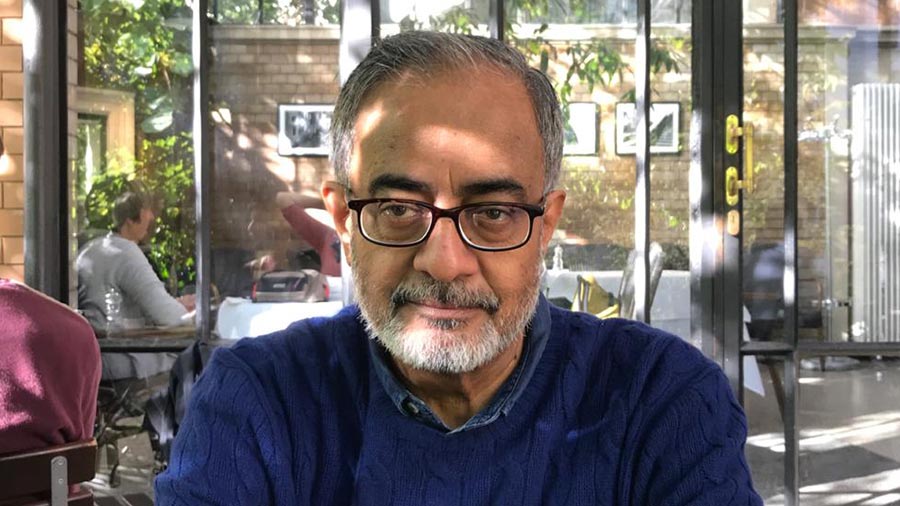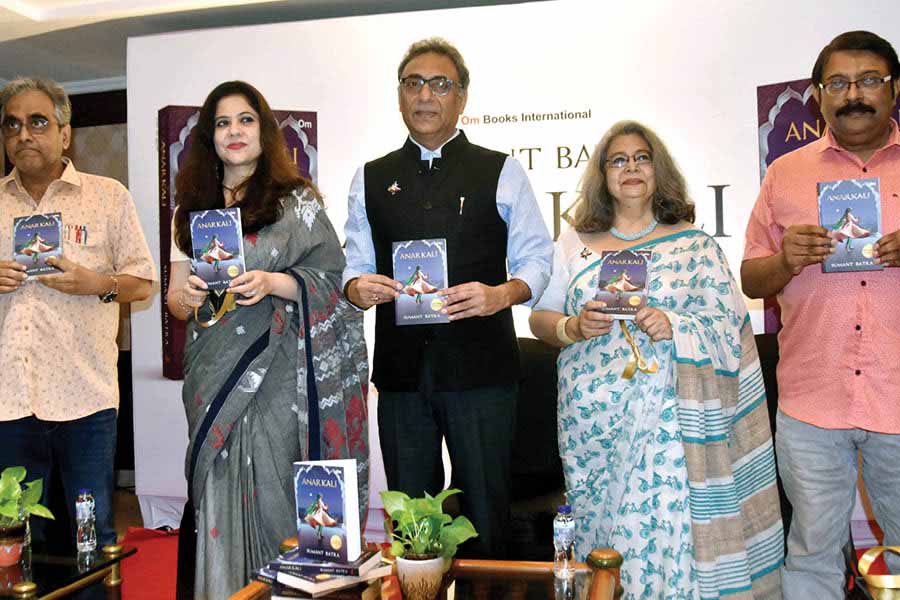Journalist-turned-sustainability champion and now author, Tathagata Bhattacharya lives up to his many roles. He follows in the trailblazing footsteps of his grandparents — theatre stalwart Bijon Bhattacharya and author-activist Mahasweta Devi — as well as his father, author Nabarun Bhattacharya.
His book, General Firebrand and His Red Atlas, published by Seagull Books, was conceived during a tumultuous phase in his life when he was battling a series of personal losses. Bhattacharya, a debut author, refuses to label his work as dystopian or magic realism, but feels it is just what he needed to write.
My Kolkata caught up with Bhattacharya for a chat about his book, his sustainability initiative, and more. Excerpts…
You come from a legacy of stalwarts in literature. How did growing up with Bijon Bhattacharya, Mahasweta Devi and Nabarun Bhattacharya shape you as an author?
My grandfather, Bijon Bhattacharya, passed away just two weeks before I turned one, so I didn’t get to know him personally. However, I heard a lot about him from my father, Nabarun Bhattacharya, who told me how he was as a human being, how he approached his characters and, later, I became familiar with his style of writing. Honestly, when you are a part of a family and especially when you are a child, you don’t realise that they are stalwarts. I grew up in a simple, middle-class family, though I knew that they were eminent writers. The best thing about coming from a family of writers is that you are surrounded by books.
Luckily for me, since my father was an avid reader of world literature, we had a treasure trove of books. I got acquainted with world literature at a very early age. Gifting and exchanging books have been a practice since childhood, and until the time Baba could move, the practice continued. Even when he used to visit me at our Delhi home, he would carry 15 books with him, of which he would give 10-12 books to me and carry a similar number of books back.
My grandmother (Mahasweta Devi), I called her Bui, would read all kinds of books, including best-selling potboilers. I lived with her for two years when I was in high school.
So, I was introduced to Yasar Kemal, Bulgakov, Grossman, Fuentes, Manuel Puig, Tolstoy, Dostoyevsky, Chekhov and many others at a very young age.
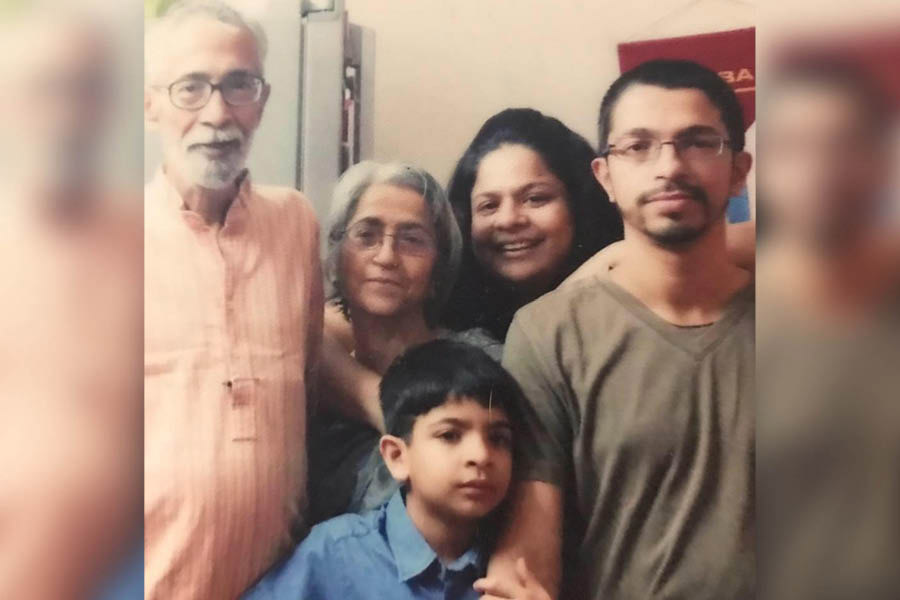
(L to R) Nabarun Bhattacharya, Pranati Bhattacharya, Nilanjana Bhowmick and Tathagata Bhattacharya with Tathagata and Nilanjana’s son Facebook
So, you lived with your grandmother for two years. How was the intellectual exchange with her back then?
We would talk about several things — books, politics, society, women, tribals etc. My parents (Nabarun Bhattacharya and Pranati Bhattacharya) used to visit often, and we had adda sessions. Many interesting people from all walks of life came by to meet Bui. People from tribal communities visited her often, seeking her help to write appeals for redressal. I think she wrote eight to 10 such letters a day! The atmosphere was intellectually stimulating, no doubt. Two houses full of books — about 40,000-50,000 books in total.
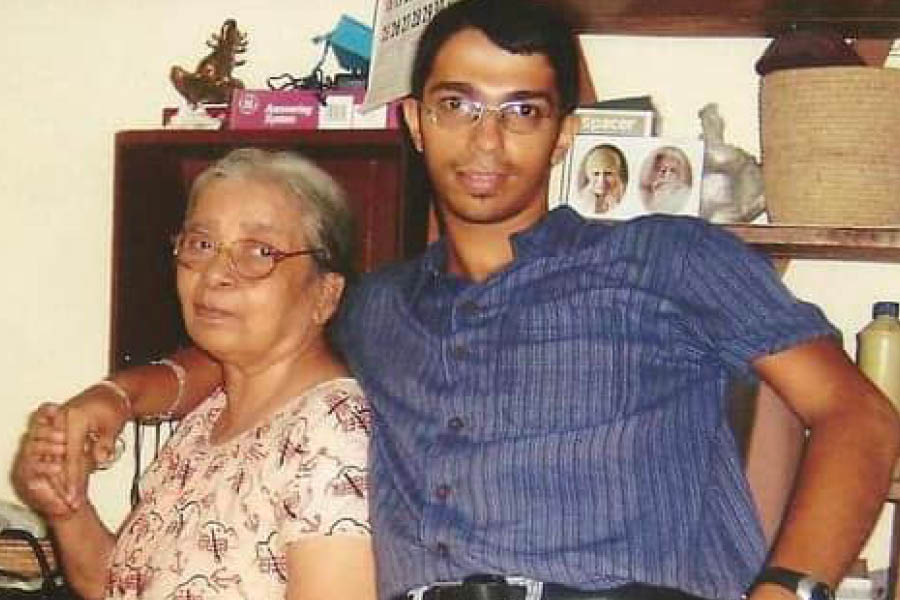
Tathatagata with Mahasweta Devi Facebook
Are there any books gifted by your grandmother or your father that you hold dear?
Sarat Chandra Rachanabali, Bibhutibhusan Samagra, works of Tarashankar Bandyopadhyay and Satinath Bhaduri — there are so many books that were gifted to me. My thakuma (Mahasweta Devi) mostly gifted me books of Bengali literature. Baba has gifted me books in both Bengali and from other parts of the world, including Bulgakov’s Master and Margarita and Grossman’s Life and Fate, among many others.
There must be several memories, anecdotes…
There are so many memories. When I was a student at the Jawaharlal Nehru University in Delhi, my grandmother or my father used to visit me. They used to stay at a place called India International Centre on Lodhi Road. I was living at the JNU hostel. Meeting my family, spending time with them and sharing a meal that was not cooked in the hostel mess were priceless to me.
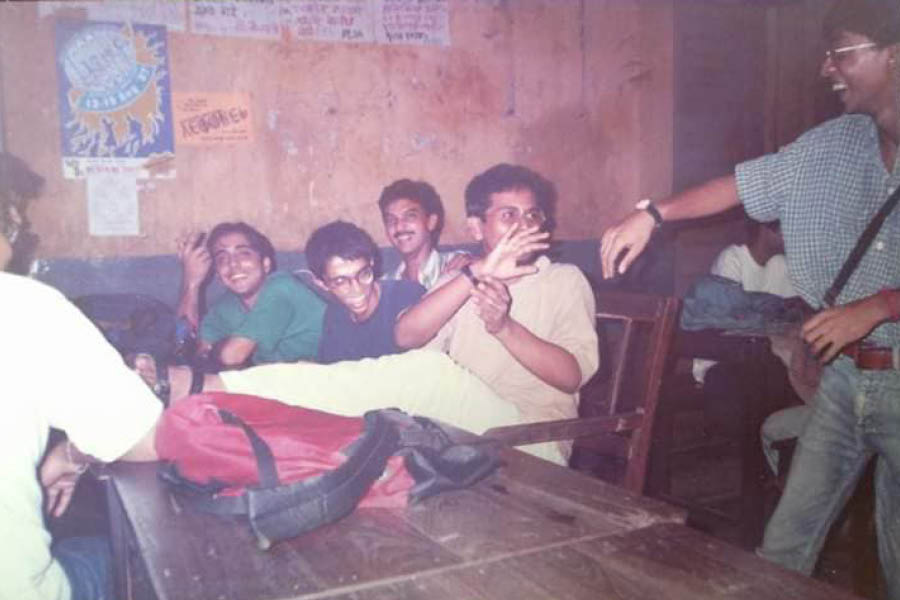
Tathaghata with his friends, during his Presidency college days
Bui was a fabulous cook, especially known for her mutton dishes, something not too many people know. My father often mentioned her incredible ability to work on several books simultaneously. Her body of work includes almost 200 books. While living with her, I saw this firsthand. She would have 4 to 5 writing pads open in front of her, writing a chapter of one novel and then moving on to another chapter of a different novel.
So, will there be a book on or about them?
Not right now. I’m currently busy with my second book and a new plot is brewing in my mind as well.
Since Baba's last book was not published, I’ve used a few characters from it in my novel. They aren’t the central characters in General Firebrand and His Red Atlas, but they do play a role — to give those characters a sense of closure.
Why a dystopian novel as your debut book? How was the story conceived?
Because we live in a dystopian world, so why not? I am not a student of literature or literary theory. I don’t know if someone will call this a dystopian work, magic-realism or speculative fiction. For me, I felt the need to write this novel just the way I see the world.
I conceived the story at quite a vulnerable period in my life. In a span of three years, I had lost my parents and my grandmother. After losing my mother, the last of the three, I tried to act cool but I could not come to terms with the loss. The series of events made me insecure and afraid.
It was then I opened my laptop and started writing. I wrote the book in less than two months — it was written in a frenzy. I had not thought of any structure but as I kept on writing, things came to me, the plot revealed itself. I knew how I wanted to end the book. I was at that juncture in my life where my understanding was that this book would save me from the storm.
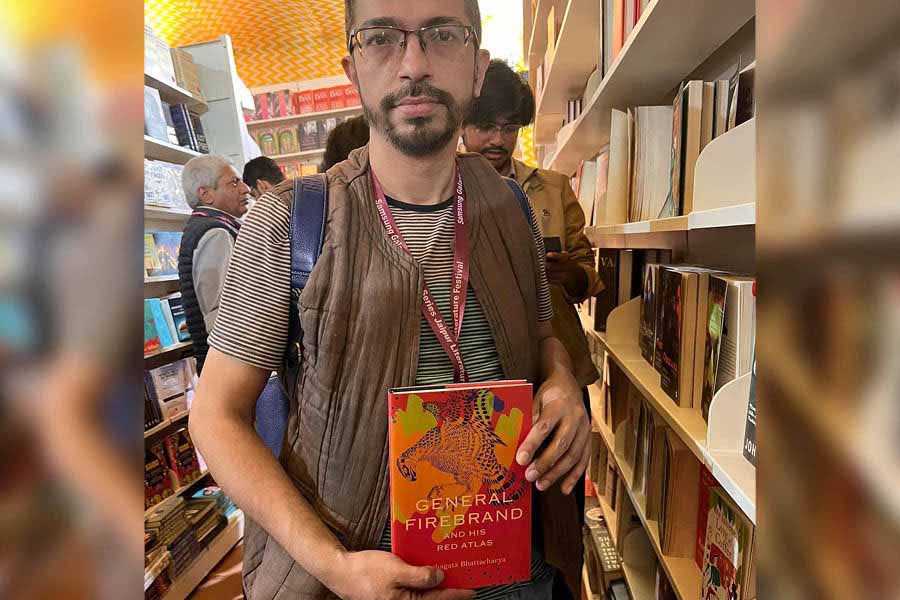
The author with his debut novel Facebook
What’s the story behind the name of your novel? ‘General Firebrand’ is an intriguing character — what was the thought process behind your novel's protagonist?
I think the character developed by itself in my head as I was writing. While writing the first chapter — and with the plot of the second brewing in my head — I was constantly thinking how to develop General Firebrand’s character. As a journalist, I have worked in various parts of the world and have met many interesting people. I perhaps have taken a few traits from them. But most parts of his character are imaginary.
The Red Atlas is an important marker in the novel. General Firebrand is the main character. He is not your conventional hero — he is a flawed character. He carries a pocket world Atlas, which holds a certain significance. You have to read the book to know more about it.
Tell us about your life in the mountains and championing sustainability.
It is a nondescript place with a habitation of around 1,000 people. My place is adjacent to the jungle. I started studying architecture when I decided to build the house. For 2-3 years, I would stay up all night and read papers and reading material on architecture. Finally, I zeroed in on one particular method of building. It’s called ferrocement, primarily because it is cheap but strong.
The house is a structure built on an armature of steel rebars, steel weld mesh and chicken mesh — all tightly bound to each other and to the foundation. Then it has been plastered with a simple cement-sand mortar. The armature structure makes it safe even in case of very severe earthquakes, there is no risk of loose elements like bricks and stones falling. My house is not square — it has roundish, wavy, concave and convex walls and ceilings. The stairs are not conventional either, there’s a wavy, organic feel to the structure. A very good architect friend of mine helped me out and I got the plan checked by a structural engineer too. Many people have liked the house and have approached me to help build similar structures. The problem is that I am not a contractor and can only give suggestions but most people want me to build it for them.
I stayed in a tent next to the jungle for years and worked with the locals. I built the house myself with their help. I have planted some apple, apricot, peach, plum and pear trees and there is a small farming area where we grow some vegetables and herbs. Life is very simple there. The nearest market is 7-8 km from my place. It is the main market centre for about 50 villages with almost 100 shops. Next to my house, crossing the gravel path, is an oak jungle where one can trek with caution. I like the peace there. There are virtually no power cuts and there’s internet. Since both my wife and I are writers, we plan to shift here permanently after a few years. I’ve built a 60,000 litre water tank, where I intend to harvest rainwater. I have built a filter for that purpose too. I am installing a small solar plant of 5 kilowatts as well. Going forward, I plan to dabble in aquaponics too.
As a reader and author, what genres do you find most comfortable, and which ones keep your thinking cap on?
As an author, I intend to write books that will make you uncomfortable. The language won’t be very polished like it is not in General Firebrand and His Red Atlas. I do not want my reader to finish the book and drop off to sleep with a calm head. I want to trouble him.
I have always admired writers who make me think.
You translated a few lines from a poem of your father in the preface. Does this hint at a translation of his poems being a work in progress?
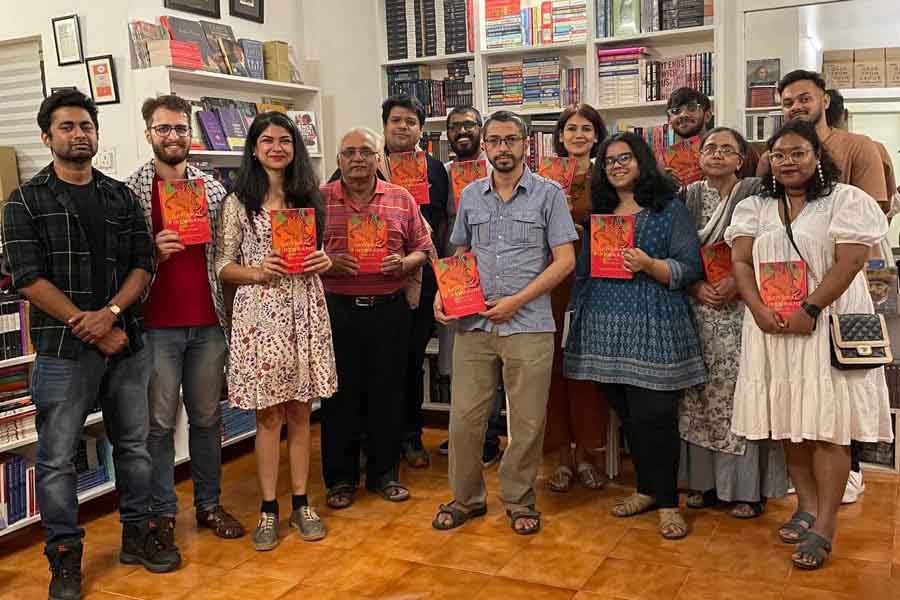
Tathagata at one of the book signing events in India
Yes, it’s mentioned in the acknowledgements. I do plan to work on that in the future.
What’s brewing next?
I’ve just begun working on my second book, and it's unfolding gradually. It is about a city and its people, exposed to a peculiar condition.
You can grab a copy here.
